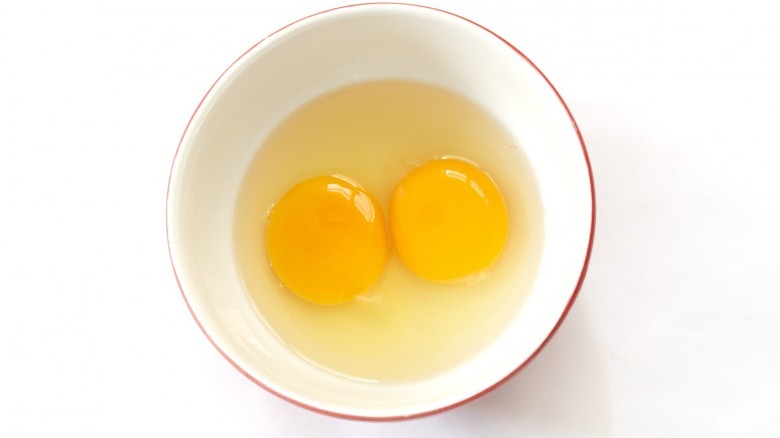Can You Eat Too Many Egg Whites?
If you love cracking open eggs for an omelet, egg salad sandwich, or as part of your favorite spaghetti carbonara recipe, you're not alone. According to Statista, Americans consumed over 286 eggs per person in 2020. This is a 14% increase compared to the 251 eggs Americans ate in 2000.
While whole eggs have historically received a bad rap due to the high level of cholesterol in the yolks, the results of a recent Canadian study revealed that it's safe to have one egg per day. "Moderate egg intake, which is about one egg per day in most people, does not increase the risk of cardiovascular disease or mortality even if people have a history of cardiovascular disease or diabetes," said study lead author Mahshid Dehghan (via WebMD). The three-part study analyzed data on more than 177,000 people in 50 countries around the globe who each consumed one or fewer eggs per day. "No association was found between egg intake and blood cholesterol, its components, or other risk factors," Dehghan said in a news release.
In spite of their inherent cholesterol, eggs are packed with nutrition that can be part of a healthy diet for most people. "The egg white contains most of the protein; the yolk contains iron, phosphorus, fat-soluble vitamins including vitamin D, B vitamins, healthy fat, and other valuable nutrients," registered dietitian Audrey Koltun told WebMD. However, while egg whites are rich in protein, there are downsides to consuming them exclusively.
Why egg whites aren't all they're cracked up to be
If you are at risk of heart disease and choose to only eat egg whites to mitigate your cholesterol intake, you should know that eating only egg whites means that you will be missing out on the healthy fats and host of vitamins and nutrients packed in the yolk, such as vitamins A, B, E, and K (via Eat This, Not That!).
Egg yolks also contain the key nutrient choline. According to the experts at Healthline, choline is a water-soluble compound with similar benefits as B-complex vitamins and provides key support for your liver, brain development, nervous system, among other important functions. While your body makes some choline naturally, it needs to be supplemented through foods. There is no official Reference Daily Intake (RDI) for choline; however, adequate amounts for adult women and men is 425 milligrams and 550 milligrams, respectively, although these can fluctuate to some extent depending on an individual's health makeup. Choline deficiency is rare, but if your body does not have enough choline, this could put your liver at risk (via Healthline).
Bottom line: Over time, eating only egg whites will leave you deficient in key nutrients. So if you need to stay away from the yolks due to an elevated risk of heart disease, be sure to look to other healthy food sources to compensate for the vitamins, nutrients, and healthy fats you're leaving behind.


